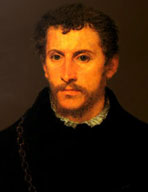The most high profile of England’s martyr priests to be executed during the time of Elizabeth Tudor was certainly St Edmund Campion who died 1 December 1581. During the year or so of his mission he preached the Word and administered the sacraments to recusants while being hunted for his life by pursuivants (the Elizabethans had a wonderful way with words.) St Edmund’s fame, or notoriety, arose because of two documents which he wrote while on the run. First a short letter, called by his opponents Campions Brag, which contained a challenge to debate the issues between Catholics and Anglicans at his old university of Oxford. Secondly, after what became known as the Uxbridge Conference with fellow recusants, he wrote, in Latin, Ten Reasons which outlined the arguments he would have made had such a disputation been permitted.
These were angry and passionate times and St Edmund’s writing style was combative, that of his opponents if anything was even more so. There is little that modern readers might find edifying in the polemics of that time. The Brag however ends on this note-
“I have no more to say but to recommend your case and mine to Almighty God, the Searcher of Hearts, who send us his grace, and see us at accord before the day of payment, to the end we may at last be friends in heaven, when all injuries shall be forgotten.”
Perhaps unconsciously Dr Rowan Williams, when he held the title of Archbishop of Canterbury, echoed this idea as, in 2010, he commemorated the Carthusian martyrs to Henry VIII-
”If Henry VIII is saved (an open question perhaps) it will be at the prayers of John Houghton. If any persecutor is saved it is at the prayers of their victim. If humanity is saved, it is by the grace of the cross of Jesus Christ and all those martyrs who have followed in his path.”
Although many great and terrible wrongs can be laid at the feet of those who call themselves Christian there remains at the heart of the faith an irreducible core which can be ignored but cannot be denied. There is an obligation to forgive, to love and pray for those who hate us and to acknowledge that every child conceived in the womb is a person for whom Jesus died on the Cross. Christians cannot despise any of their fellow humans. The recusants who were involved in activities like the Gunpowder Plot and Anglican Elizabeth’s chief torturer Topcliffe (like the Queen herself) may have forgotten this but fortunately for the reputation of Christianity St Edmund and many like him did not.
It is relatively easy to preach high sounding sentiments but the challenge is to live them out in the little details of life. Evelyn Waugh, author of Brideshead Revisited, wrote a masterly biography of Campion which recounts many such instances. Perhaps the most outstanding is the case of George Eliot, not the author but a spy whose treachery and perjury brought St Edmund to the scaffold. Visiting the martyr in gaol Eliot asked for forgiveness not because he feared for his immortal soul but rather for his mortal body since he had grounds to think that certain less saintly Catholics than Edmund were likely to seek vengeance for his treachery. Although still in agony from the rack and other tortures which Eliot had delivered him up to Campion’s reply is a classic of its kind-
“You are much deceived if you think the Catholics push their detestation and wrath as far as revenge; yet to make you quite safe, I will, if you please, recommend you to a Catholic duke in Germany, where you may live in perfect security.”
There can be few more Christlike images than that of a man who, bearing the marks of suffering upon his body, takes anxious thought for the well-being of the person who holds chief responsibility for those marks. As it happened Eliot did not take advantage of the offer and returned to his trade of spying but St Edmund’s gaoler, Delahays, who heard the conversation was so moved by it that he converted to Catholicism. We can hope that in this country never again will we be visited by such an evil as religious persecution but perhaps more than that we can also hope that in every evil that does visit us we will never lack for Christians filled like St Edmund with the spirit of forgiveness and generous love. By the grace of God may we ourselves be such Christians.
@stevhep
Like the Catholic Scot page on Facebook
My other blog is thoughtfully detached

No comments:
Post a Comment